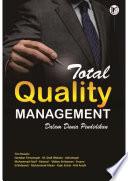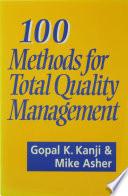
TOTAL QUALITY MANAGEMENT
This book presents a comprehensive view of concepts, principles and practices of Total Quality Management (TQM) from basics through advanced tools and techniques for practical implementation.It is well known that ‘Total Organization Involvement’ in understanding and implementing TQM, along with the integrated business strategy, provided Japanese organizations with a strong platform for a meteoric rise to world-class performance and global leadership in every sphere of their operation. The success of TQM therefore depends a lot on the strong foundation and infrastructure of an organization. This is the crux of the author’s theory of ‘Holistic Management System for World-class Performance and Leadership’ expounded in this book. It is a TQM-based model that helps create a world-class management system for performance excellence and global leadership. The concluding part of the book cites several examples of practical implementation of TQM principles and practices in various manufacturing and service sectors of the Indian industry, providing elaboration and analysis of each case study. The book is aimed at undergraduate and postgraduate students of management as well as students of most engineering disciplines. It can also be used by the industries as a valuable guide to continuous improvement and implementation of a world-class management system in line with the TQM principles and practices. In a nutshell, the book provides wide coverage of areas related to TQM and integrates all its processes, tools and techniques under one management system to help businesses grow and excel. This is indeed the unique feature of the book.
- ISBN 13 : 9788120330566
- ISBN 10 : 8120330560
- Judul : TOTAL QUALITY MANAGEMENT
- Pengarang : P. N. MUKHERJEE,
- Kategori : Business & Economics
- Penerbit : PHI Learning Pvt. Ltd.
- Bahasa : en
- Tahun : 2006
- Halaman : 438
- Google Book : http://books.google.co.id/books?id=RxQIWc28__AC&dq=intitle:total+qualiti+manajemen&hl=&source=gbs_api
-
Ketersediaan :
In a nutshell, the book provides wide coverage of areas related to TQM and integrates all its processes, tools and techniques under one management system to help businesses grow and excel. This is indeed the unique feature of the book.








